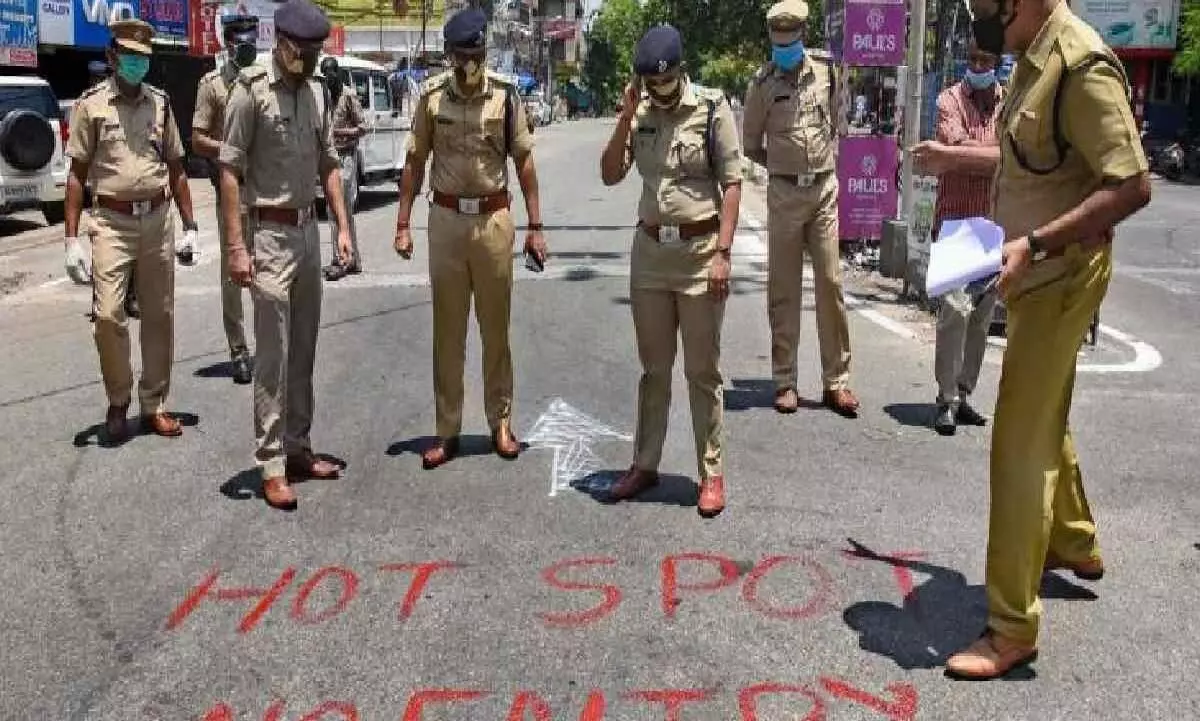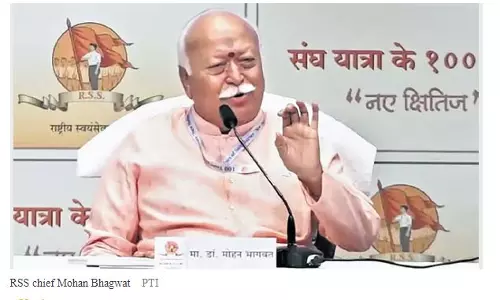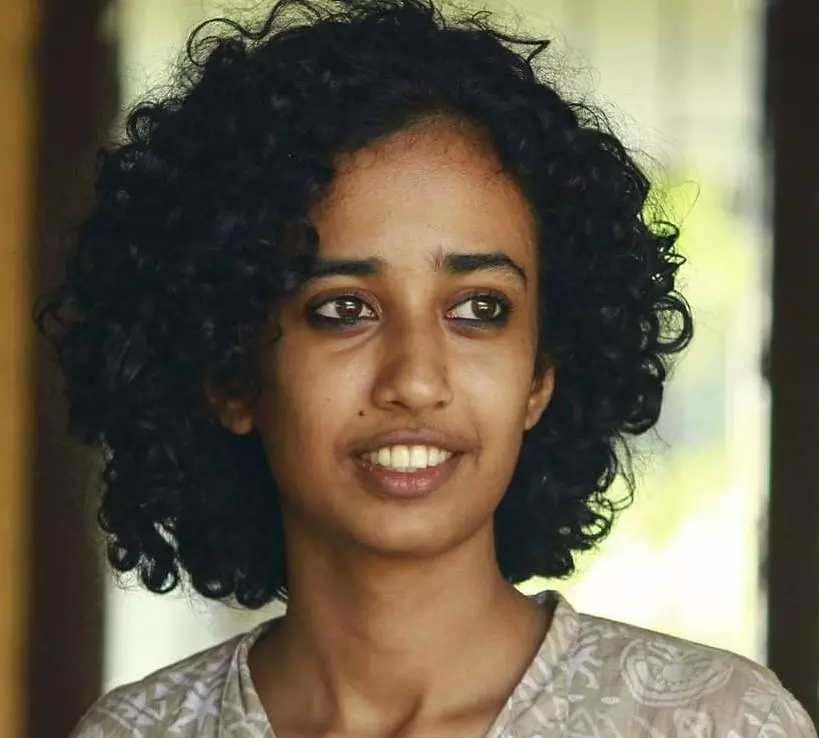

Representative Image: PTI
How Kerala's lockdown failed in second wave
text_fieldsBeginning with weekend restrictions and night curfews, a complete shutdown began in Kerala in March until June 2021. The state witnessed less chaos and low mortality when the other states witnessed deaths in thousands per day during the second wave. Kerala had imposed lockdowns claiming to be protective of people's means of living, along with ensuring security for lives. But the number of cases is increasing every day, with fewer downfalls in the curves.
ICMR's fourth round of seroprevalence survey indicates that the state will have to live with COVID infectiousness for a long way ahead. The current surge has brought expressive discontent from the public and medical professionals towards the state's lockdown policy.
With disparities in vaccine availability and vaccination, the exposed public is anxiously expecting another lockdown and complete shutdown. The exposed public, which includes essential service providers and frontline workers, is under pressure to make sure they get vaccinated. On 24th July, The Hindu reported incidents of police intimidation on autorickshaw drivers to stop unvaccinated drivers from continuing in service in Kozhikode. But the process of getting registered for vaccination slot remains to be a hurdle. The vaccination centres are overcrowded without any proper measures to keep social distancing. This delay in getting at least the first dose of vaccine at the edge of being excluded from the 'vaccinated herd' would place a socioeconomic challenge before the pandemic directly hits communities.
Private hospitals charge around 800 rupees for a single dose of vaccine. Making vaccination and COVID negative certificates mandatory for intervening and serving professional duties in public places is evaluated as extreme.
If in the first wave the government could limit the virus spread to 10.6% people, in the second wave and its settling period, around 44% of Kerala population is infected and have antibodies.
As explained by former director of the social security mission Kerala, Dr Muhammed Asheel, in an interview given to Madhyamam English, even during the lockdown period, the government wasn't expecting a dangerous breakdown in the system because it still was continuing the strategy of delaying the spread by imposing lockdowns. The state used curbing the movements step by step and was on alert to impose complete lockdown to maintain the surge capacity threshold. But how effective it could contain the virus is a fundamental question.
Kerala lost grip on 'avoiding three C's'?
The three C's are close contact, closed spaces and crowding. By avoiding the three C's, the spread can be limited to an extent. Dr Asheel insisted, "If we don't follow this keenly, things will reach our health system threshold". Dr Asheel proposed vaccinating the maximum number of susceptible populations but expressed that the availability of vaccines is a problem the state is facing. The focus was on the surge capacity of hospital facilities, but even then, several districts faced unparalleled challenges in the case of the number of CoVID beds and oxygen availability. He explained the lockdown-unlocking could be balanced with adequate vaccination and the government's aim at reducing the death rate. In the past few days, Kerala recorded a high mortality rate in its CoVID case history. The citizenry and opposition parties had raised questions regarding the exact recording of CoVID deaths, more strongly when the Supreme Court of India enquired into providing compensation to the families of patients who died of CoVID.
Test Positivity Rate is set as a meter to impose lockdown restrictions. According to World Health Organization, the Test Positivity Rate, if below 5% in a locality, indicates the transmission is under control. Test positivity is a meter characterized by relativity. Test positivity is dependent upon how many tests are being done on what kind of population. Only constant follow up on localized testing facilities on the same population would be helpful to get the exact test positivity rate in a region. But now, micro lockdowns are determined by test positivity.
Kerala lockdowns policy is facing criticism. The Indian Medical Association has urged the government to revise its CoVID lockdown strategy. It stressed allowing the shops to open all days to avoid crowding during a single day in a week. The IMA termed it 'unscientific'. It opposed the government easing the lockdown for three days before Bakrid. IMA expressed its discontent over community testing instead of contact tracing and isolating infected persons. The effectiveness of Kerala's first-line treatment centre facilities too was questioned by IMA.
With the unscientific unlocking of shops on one day in a week and an unrestricted, public transport system, including limited and unrestricted inter-district bus services and interstate train services, the state will have a higher rate of infections an upward-moving mortality graph. Herd immunity depends not just on vaccination, but ensuring effective vaccination through the public health system is the only way.
According to an auto driver in Kozhikode who spoke on anonymity, imposing lockdown on Saturday and Sunday sounds fooling. "Because of this on Mondays, people rush. If people can move within a restricted time on Saturday and Sunday, the anxious rush on Monday can be reduced. Doctors say the virus mutates. Can these vaccines resist the mutations the CoVID19 virus is getting? The mutation does not follow any norms. It depends on several factors, including climate, the body type of the infected person etc. Waves of infections are being tracked. How do one sense it approaching and not do anything concrete to prevent it? Why is it still an unaccomplished task to vaccinate the entire Indian population?" he asks. "Some time back, I've read a story, where Hitler's Nazi Germany is contextualized. The story mentions a virus and tells that equality will remain a dream even if the virus goes. In the pandemic, we love each other and help each other, but once it all goes, things will be back to normal," he added.
Viji Penkoottu, Kozhikode-based women's rights activist and labour leader, says the pandemic lockdown has intensified the daily hard work of female labourers. She asks why the female textile labourers aren't considered for priority vaccination. She explains how the pandemic imposed stressful years and mental health challenges upon them. "Most of the families run on loan. Since the family responsibility falls upon women, the emotional labour gets intensified. An employed woman is forced to carry two roles: a 'woman labourer' and a 'mother labourer'. They are stressed out. Let the government form a commission to study what the women labourers are going through. But unless the labourers in the unorganized sector are treated as labourers, they will not benefit from the state. Male labourers somehow get to have eight hours of sleep. Still, sleep hours for women are half of it," Viji says the female labourers who seek help at her organization Asanghatitha Thozhilali Union (Unorganized Laborers Union) are guided to medical help as well.
"A woman labourer who used to get Rs 10,000 per month, now gets three days job and is paid only meagre wages. They must be paid at least half of the salary. Textile labourers aren't included in the priority vaccination, and they are very vulnerable to infections. Traders are asking for more shop open days. It is good for labourers too. The owner of Kalyan Silks appeared in the channel discussions challenging the government. The only thing I've to tell them is they must end exploiting unorganized labourers," she said. "The easing of restrictions on consecutive three days for Bakrid wasn't done right. It is the state's responsibility to protect the lives of citizens," she added.
New market system and labour rights concerns reveal why the lockdown strategy must be changed
"Shopkeepers can't pay the rent for the shop building or pay our employees. We need relief. The shops have to be shut by 7 in the evening, by that time if the employees come together in more than five, we face fines. This needs to be changed. We are unable to take it forward in a better manner even if there is lockdown easing. We are exposed to passengers. We need to be ensured vaccination. CoVID tests are being done on those who work in shops. We are dependent on passengers. When we use currency, we do not know if the sanitiser really helps. Because COVID had to sell my business as an expat, in a huge loss. Our lives are vulnerable," says Abdu Rahman, a shop owner near NH 66.
Chandan, a migrant worker from West Bengal, started a street shop of footwear. Chandan had been working in Kerala for the past fifteen years. "This is a tiny business, and not many people stop by. Those who travel in cars don't stop. One or two customers we get daily, the people belonging to lower class buy footwear on their way back from work. After seven, we might get more customers, but by seven, we have to shut the shop." Chandan is an employee in NEXO footwear. He doesn't have regular work in the company.
Studies show that the virus mutants differ in infectiousness drastically. Another complexity arose when a doctor in Assam's Dibrugarh got infected by the virus's Alpha and Delta variants. The female doctor had taken both doses of vaccine.





















